| Srl | Item |
| 1 |
ID:
079623
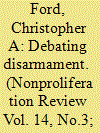

|
|
|
|
|
| Publication |
2007.
|
| Summary/Abstract |
The author offers a close analysis of Article VI of the Treaty on the Non-Proliferation of Nuclear Weapons (NPT), the treaty's only article dealing with disarmament, focusing upon both its text and negotiating history, and assesses its applicability as a standard for judging treaty compliance. The author critiques comments on Article VI made by the International Court of Justice in a 1996 case as legally ill founded and conceptually incoherent as a compliance yardstick. The only interpretation of Article VI consistent with its text and history, the author argues, is that it - as it says - merely requires all states to pursue negotiations in good faith; specific disarmament steps are not required. Claims that the 2000 NPT Review Conference imposed new legal obligations for disarmament or altered the meaning of Article VI are found to be mistaken; although the conference could theoretically have adopted interpretive criteria for understanding the meaning of Article VI, it did not in fact do so. Applying his Article VI compliance standard to the case of U.S. compliance, and comparing modern circumstances with those during the Cold War, the author also describes what he says is an excellent U.S. record of Article VI compliance
|
|
|
|
|
|
|
|
|
|
|
|
|
|
|
|
| 2 |
ID:
086468
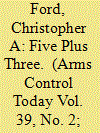

|
|
|
|
|
| Publication |
2009.
|
| Summary/Abstract |
The Obama administration has stated its intention to conclude a treaty cutting off production of fissile material, highly enriched uranium (HEU) and plutonium, for nuclear weapons. So did the administrations of George W. Bush and Bill Clinton. Although a fissile material cutoff treaty (FMCT) has been a key objective of the UN Conference on Disarmament (CD) for many years, that organization seems unable to break out of its now customary paralysis.[1] This experience should encourage the Obama administration, if indeed it wants such a treaty, to look to another forum for realization. More importantly, it may be vital for the new U.S. administration to take a different approach because pursuit of an FMCT as currently contemplated at the CD might well have the ironic and presumably unintended consequence of gravely undermining the nuclear nonproliferation regime. Fortunately, such a new approach may well be available.
|
|
|
|
|
|
|
|
|
|
|
|
|
|
|
|
| 3 |
ID:
061719
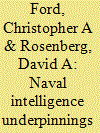

|
|
|
| 4 |
ID:
083873
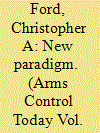

|
|
|
| 5 |
ID:
141453
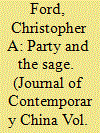

|
|
|
|
|
| Summary/Abstract |
The current bloom of quasi-Confucian political thinking and writing in the People's Republic of China (PRC), encouraged by the Chinese Communist Party (CCP) and deployed both to discredit Western ideals of democratic pluralism and to rationalize continued one-party rule in China, has been a long time coming. This article examines the origins of this line of thinking, its development since its first appearance with the CCP's cultivation of Confucius studies in the mid-1980s, and the current parameters of this discourse as it has taken a growing role in Beijing's domestic political and emerging geopolitical narrative.
|
|
|
|
|
|
|
|
|
|
|
|
|
|
|
|